


Home Energy Water Work Economy Solution Politics Team Product Recycling Cars Ships Aircrafts Promotion
World Pollution Air Weather Violence Women Weapons Psychology Plants Animals Food Peace Faith Imprint
Water
Desalination World Champion and Recycling Champion Israel:
Israel covers more than half of its national water needs with water treatment plants. That's world record.
This would definitely be a strong solution for e.g. Africa, Iraq, Iran and other countries. At the same time, precisely these states could benefit from an energy supply via thermosolar systems. In Europe and North America, water could be desalinated using excess wind power.
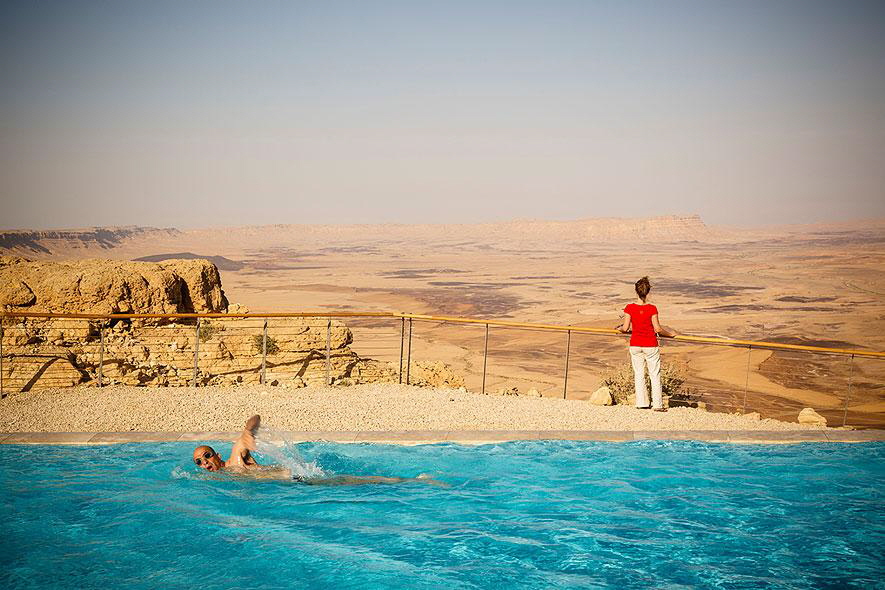
A hotel pool in Mitzpe Ramon, in the middle of the Negev desert. With new technologies, Israel can now cover a large part of its water needs even in times of drought. Source: GEO online
But why should Europe and America think about these methods?
Especially in Europe, water is becoming scarce, not only in Spain but also in France and Germany the water table is falling like a stone thrown from a tower. In Eastern Europe, too, droughts threaten to destroy harvests and forests. The situation is currently particularly serious in Poland. Harvest failures, dried up forests and rivers and lakes drying up are just three of the many consequences of constantly new heat waves.
To speak of "climate change" in this context is really outdated and also completely wrong. It would be climate change if the climate were to change by itself, but here the surface warming, which after the latest events in Valencia with 47°C has to be called surface heating, is in direct correlation with industrial mass production (see correlation).
Things are no better in the USA, the big cities swallow up so much water that the surrounding forests and fields are drying up. Huge agricultural areas require irrigation, but this is no longer possible due to the enormous water requirements of the cities. In the cities, private individuals are no longer allowed to water their lawns and are replacing them with artificial turf, i.e. plastic, which of course is not a solution at all, but only increases the proportion of microplastics in the environment.
Reforestation is supposed to be the solution when it comes to binding and reducing CO2, using trees that are specially adapted to the temperatures. Experiments with such trees were made in Mexico and the results were devastating, namely they drew the water from the surrounding agricultural land and the water table was falling much faster. So not a real solution either, if only because at 47°C it would probably be better to work in an oasis, like in Morocco, which also die, without additional irrigation or replenishing the groundwater level.
Afforestation without water not possible
Afforestation of 900 million hectares of forest could swallow two thirds of CO² emissions. This message comes from Jean- Francois Bastin of the ETH Zurich and his colleagues. But he has made the bill without the host. There is a shortage of water everywhere, and the groundwater level is constantly falling. So first of all, we need utopian amounts of water. Just to protect the existing forests, we need more water, more than we have at the moment. Gigantic investments are needed to realize this, investments that will not yield big returns. In the US, huge tracts of land are broke because water is missing. In Chile, the groundwater is withdrawn from the poor farmers through gigantic avocado plantations, and about 21,000 tons of lithium are produced in Chile.The lithium production requires gigantic amounts of groundwater, alone in one location up to 21 million liters daily. Chile is becoming a desert. All over the world, water evaporates from the human made artificial warming of the atmosphere. The groundwater levels fall daily. Under these circumstances, it is impossible to grow large areas. Also, food production will soon reach its limits. In Germany, one of the most water-rich countries in the world, the fields dry up and in summer the water level in the rivers sinks so low that shipping is hardly possible any more. What Brazil is up to do now is sheer madness. Primeval forests grow on a thin layer of humus, below that there is only sand. For the cultivation of crops and animal husbandry, very large amounts of water are needed, but Brazil will not have it without the rainforest. So Brazil will first be a steppe and then become a desert.
It works only with a lot of desalination plants, a gigantic world water network, indescribable investments with less returns
So we have to build desalination plants, get the water out of the seas and bring them to the fields and forests before we indulge in any fantasies. Studies are made quickly. Easily earned money that governments like to pay to reassure the people. But this is not a solution but should only helpthe politicians to finnish their term without bigger trouble.
There is another aspect: to fill up groundwater and, also to the deserts, back up forest, presumably leads to strong cloud formation, which could quickly cool the earth down again to a global average temperature of 20-25 ° C.
But: There are several problems with the facilities. Read below what it is about and how it can be avoided
The largest seawater desalination plants are located in dry regions such as Israel, the United Arab Emirates, North Africa, Morocco, Spain and North America, specifically in 177 countries around the world. In 15 906 desalination plants, 95 million cubic meters of fresh water are produced every day, but unfortunately also 142 million cubic meters of brine. This concentrated brine contains not only salt but also chemicals and dissolved metals such as: magnesium, sodium, calcium, potassium, bromine, copper, chlorine and lithium, which have been shown to cause cancer and can damage the genome. These substances are intended to prevent plant clogging. Instead of recycling this dangerous soup, which would be possible without further ado, the brine is usually pumped back into the sea and considerably damages the sea creatures living there. In addition, these substances, especially the dangerous heavy metals, end up in our food chain.
Also the dumping in deep wells or final storage after drying, in underground storages is of course not a permanent solution. The health risks also exist here.
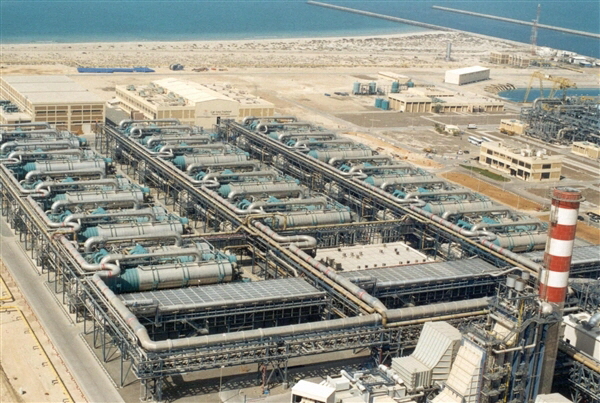
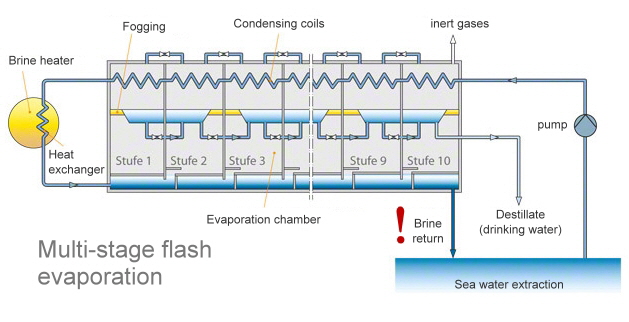
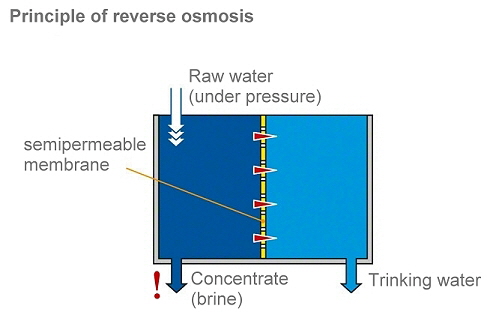
The preparation of the brine is possible and urgently necessary
It is entirely possible to develop and apply better treatment methods for these residues. They could be brought out and used again. However, this would reduce the operators' profits, which is why they are usually not used. Here, too, the so-called economy comes before the environment and health protection. According to the German Basic Law, at least all of these procedures would be strictly prohibited. The technology of processing has not yet been fully developed and recovery is not competitive. But if you calculate the follow-up costs, for the sloppy handling of the remains of a production, as has always been done in capitalism, we come to a very negative balance.
Here, too, I would like to consider that, due to the so-called economic efficiency, we are all in exactly the place where we are, namely on the verge of an ecological collapse, and we would have given up ours from the start Simply dumping dirt into the environment and simply blowing our exhaust gases into the air, cutting everything down and looting it, yes, then we would not need any desalination plants at all. But now they are necessary and we should, at least now, understand that the “economic viability of so-called competitiveness” was a very expensive and stupid undertaking, and the costs have only been shifted exponentially, expanding into the future, and still are will.
There are also other ways to walk with the brine
A completely different process is used here which does not require any chemicals and / or metals. The seawater is pre-filtered and desalination is carried out via evaporator pipes in a steam compression room. The water quality is excellent and can be used to produce drinking water. The best thing about it is that the clean brine can be used medically in brine baths or over salt pans for the production of table salt.
This new procedure is funded by the Federal Ministry of Education, Science, Research and Technology (BMBF) and the Ministry of Economy and Affairs of the European Union, Mecklenburg-Western Pomerania.
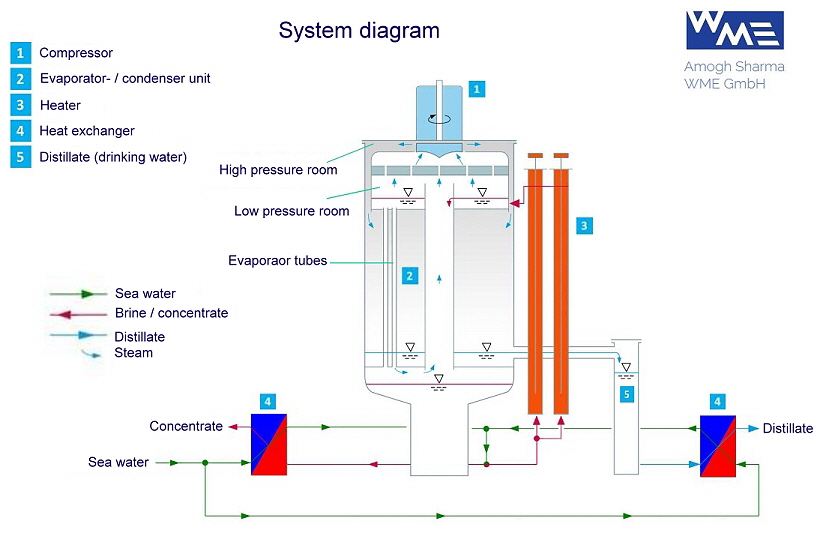
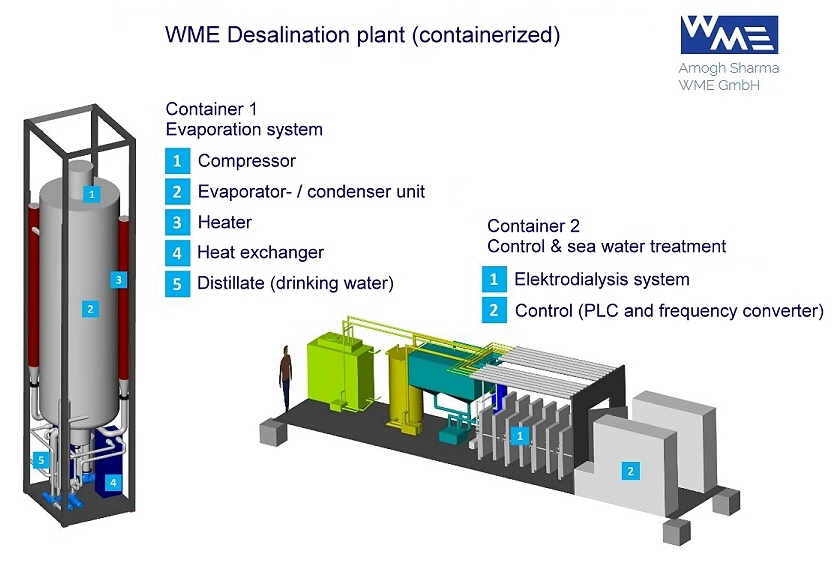
Under the link opposite: https://www.wmea.eu/ you can get an idea of the advantages. The systems are still comparatively small and could, I think, be quickly planned and built on a larger scale.
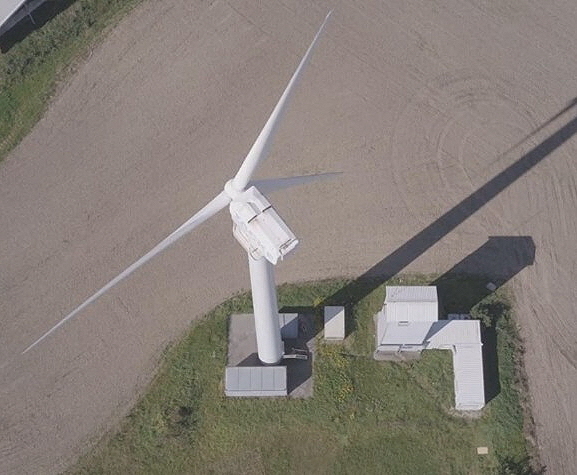
Completely network-independent desalination plant Source: WME
Instead of pumping billiards of money into a dilapidated mass production economy or putting billions of dollars into research power plants (fusion reactors) that will never provide energy, one should invest more in such plants, in practicable techniques to deal with the upcoming environmental problems.
Other Desalination Plants
We should no longer use reverse osmosis systems, but rather evaporated salt works. However, we can only use this technology on the coasts of warm zones because we heat the salty water with solar energy on relatively flat stainless steel sheets encased in glass. The water evaporates, and we collect the pure water vapor, cool it, and transfer the water to tanks. This technology reduces CO2 emissions by 1,400 percent compared to reverse osmosis.
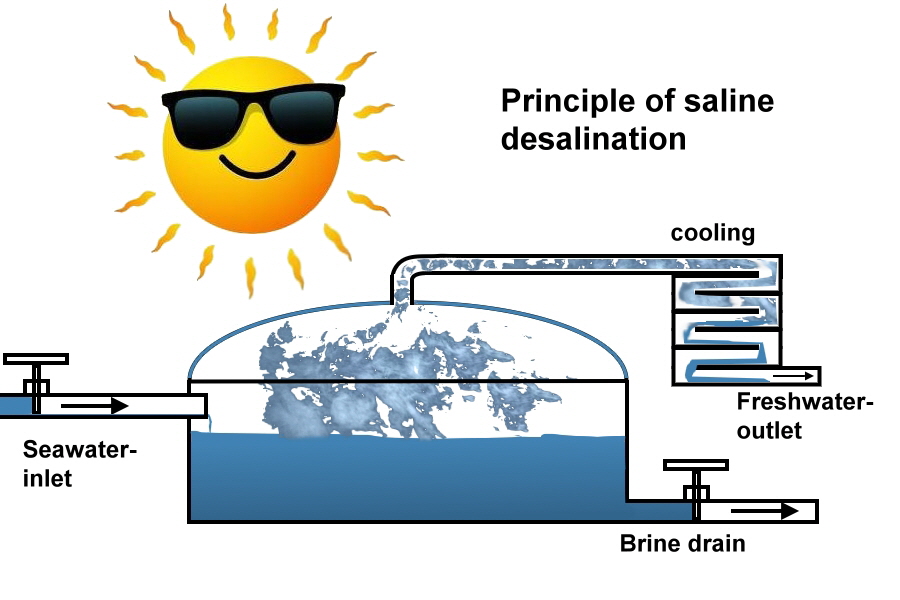
We would need hardly any external energy and, above all, no chemicals. This process produces little non-toxic brine or even no wastewater at all, because salt is extracted simultaneously. Furthermore, various minerals such as calcium, magnesium, sodium, chloride, and even lithium can be extracted from this brine through nanofiltration.
In order to produce drinking water, however, we have to add important minerals back to the water, so some of the extracted minerals are used again. If the water is used to produce hydrogen, irrigate fields, or replenish groundwater reservoirs, mineralization may not be necessary because no minerals are needed, natural fertilizer is added, or the water absorbs minerals from the soil. Incidentally, sea salt is of high quality and very sought after. Rock salt from mines would then hardly be used anymore; chefs all over the world swear by sea salt. There are already special desalination plants that produce sea salt foam, known as Espuma de Sal. The waiting time for this salt is months. The same applies to Flor de Sal, the flower of salt, a layer that forms on top of the brine in the last basin and is skimmed off by hand. The industrial production of fertilizer from sea salt instead of rock salt is possible in principle, since both essentially contain sodium chloride. Sea salt can have a higher mineral content, so for fertilizer production, sea salt would have to be processed and processed into a product suitable for agriculture, similar to what happens with rock salt.
The process itself isn't anything new or breathtaking, but rather the same as how salt was once produced on land from mines and at sea in large, shallow basins. The water evaporated, and the salt remained. On land, energy was required, but at sea, the sun did it. Here, we combine the pan technique of mine salt production with the evaporation technique of basins at sea, and with the technique of liquor brewers by collecting, cooling, and utilizing the evaporating water.
Osmosis technology, a membrane that filters minerals, salts, and other dissolved substances from the water, can ensure that our water is free of minerals and limescale, making it ideal for hydrogen production. These osmosis systems would then also be located on-site, close to the hydrogen production facility.
The Rainmakers
Is vaccinating of clouds a solution to gain water?
Roelof Bruintjes from the National Center for Atmospheric Research (NCAR) and a team of researchers in Coahuila (Mexico) sprayed clouds with a mixture of sodium, magnesium and calcium chloride to create artificial rain.
Smallest drops of water from the clouds accumulate on the condensation nuclei formed by salt particles. If sufficiently large water droplets have formed, they fall fast enough to fall down in absolute terms in the surrounding thermal updraft. The rain produced in this way is stronger than natural rain and extends over a larger area. However, some problems arose in long-term tests.
Salts are deposited in the soil, accumulate there, salinize the soil over time, get into the groundwater, are absorbed by plants, are dangerous for microorganisms, significantly disrupt the biostructure and are dangerous for grazing animals.
Hailplanes use silver iodide, which is ejected from a solid combustion body in the form of fine smoke particles and distributed by the turbulence behind the fixed-wing aircraft. The silver iodide used falls to the ground with the rain, in a dose that is said to be harmless to human health. Silver iodide is a chemical compound of silver and iodine. It is a yellowish salt insoluble in water. Silver iodide mixed with acetone is sprayed from hail flyers in order to create the smallest condensation nuclei in the atmosphere for the targeted formation of rain or hail.
However, even in small doses, silver iodide is dangerous for microorganisms and thus for the biostructure of the sprayed areas. It also accumulates over the years to a toxic amount and also contaminates the groundwater just like fertilizers, pesticides and fungicides...
Silver iodide is toxic to humans, animals, plants and water. It is marked with the pictogram fish and tree. Penetration of silver iodide into surface and ground water or the sewage system must be prevented at all costs.
Home Energy Water Work Economy Solution Politics Team Product Recycling Cars Ships Aircrafts Promotion
World Pollution Air Weather Violence Women Weapons Psychology Plants Animals Food Peace Faith Imprint